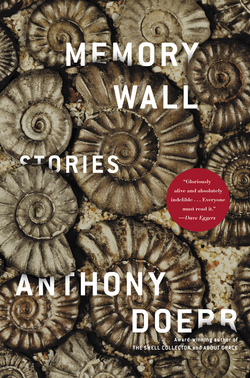
photo by Sander Klaver
by Tania Hershman
Here’s a caution to all short story writers: if the first story in your collection is too good, if it happens to actually be a masterpiece, watch out. You may set such high standards that even you might not be able to meet them. This is the “problem” with Anthony Doerr’s Memory Wall. I found the title story, which opens the collection of six, so astonishing, so brilliant, so moving – it moved me to tears each time I read it – that the other five stories, which, without the giant shadow cast by ‘Memory Wall’, would be at worst very, very good indeed, had a hard time holding their own. Mostly, though, they do.
Now, how to review the masterpiece without simply gushing? Another “problem”! At 85 pages, ‘Memory Wall’ is on the cusp of novella territory. As a devoted reader of flash fiction who often loses patience with stories longer than four pages let alone 80, I was dubious. In fact, I was dubious about the whole collection, given the accolades it had already received. I challenged it to win me over. You may have already guessed that it did.
The story is divided into very short sections with seemingly-innocuous subtitles such as ‘Tall Man in the Yard’ and ‘Treasure Island’. The opening paragraph is also deceptive: it appears to simply state facts, but a closer reading shows that it foreshadows every element of this story:
Seventy-four-year-old Alma Konachek lives in Vredehoek, a suburb above Cape Town: a place of warm rains, big-windowed lofts, and silent, predatory automobiles. Behind her garden, Table Mountain rises huge, green, and corrugated; beyond her kitchen balcony, a thousand city lights wink and gutter behind sheets of fog like candleflames.
Unpacking this paragraph, it’s all here: this is a story about age and ageing, about predators, about the land, about history, about modernity versus nature, about technology old and new, about the fog of memory, about contrasts and the grayness of life, the lack of easily-defined good and evil.
 This is a science fiction story in that its central conceit involves fictitious technology for storing memories. This is a thriller about missing treasure. This is a coming-of-age story, a story about racial tensions, exploitation, science. About love, parents and children, marriage, death, crime, history, fossils. About what we will leave behind. This is a story that exposes the futility of trying to label any piece of writing, to put it in one neat box.
This is a science fiction story in that its central conceit involves fictitious technology for storing memories. This is a thriller about missing treasure. This is a coming-of-age story, a story about racial tensions, exploitation, science. About love, parents and children, marriage, death, crime, history, fossils. About what we will leave behind. This is a story that exposes the futility of trying to label any piece of writing, to put it in one neat box.
The story unfolds in a concertina fashion, moving between Alma and her manservant, Pheko, and his small son, the man in the yard, the child the man in the yard stole/saved. The weaving of their stories took my breath away – as a writer, I could imagine the enormous time and effort it took. It was perfectly done, exactly the information you needed at the ideal pace and point in the story.
I won’t give away the plot, which relies upon this new world in which memories can not only be saved onto cassettes, they become a commodity to be traded and a drug for those whose present is not the place they want to live in. But the beauty here is that each character is alive, you care about them; even those with nefarious intentions are not wholly bad. Everyone has realistic and complex motivations for their actions, has impulses and desires that are familiar to us. This is how the greatest fiction should be, in my opinion. Through this story, Doerr touches something deep within the human psyche, something primal and intimate. I cannot recommend it highly enough.
Now, my declaration about the other stories having trouble holding their own was a bit of an overstatement because although the next two stories didn’t speak to me, I did very much enjoy the final three stories in the collection, which work beautifully together. ‘Village 113’, another story divided into smaller, titled sections, also deals with loss and memory, but in a very different way, with the imminent destruction by submergence, of a village in an unnamed Asian country.
The main character is a seed keeper, a very clear metaphor for what is being lost here. Her only son, Li Qong, who has moved to the city, returns as part of the effort to persuade reluctant villagers – including his mother – to leave. This is also a story about mothers and sons, about one generation coming after another, about nature versus technology:
Now it is dusk again and Li Qong sits at her table in his jacket and tie and recites numbers. The dam will be made from eleven million tons of concrete: Its parapet will be a mile long; its impoundment will swallow a dozen cities, a hundred towns, a thousand villages. The river will become a lake and the lake will be visible from the moon.
‘The size of things,’ he says, and smoke rises past his glasses.
The river is the connection between this story and the next, ‘The River Nemunas’, in which a suddenly-orphaned American teenage girl is sent, with her dog, Mishap, to live with her grandfather in Lithuania. Doerr is excellent at not taking his stories in the directions you might predict, but without fireworks, very quietly and poignantly. Where ‘Village 113’ is told by a distant third-person narrator, here we are right inside the head of our main character, Allison, who lost both parents to cancer within three months:
And then I feel the Big Sadness coming on, like there’s a shiny and sharp axe blade buried inside my chest. The only way I can stay alive is to stay absolutely motionless so instead of whispering Dear God how could you do this to me, I only whisper Amen which Pastor Jenks back home told me means I believe, and I lie with my eyelids closed clutching Mishap and inhaling his smell, which always smells to me like corn chips, and practice breathing in light and breathing out colour… like the counselor told me to do when the panic comes.
The final story in the book, ‘Afterworld’, takes the themes of death and grief forwards. Another skilfully-woven and weighty, poignant story, it intertwines the present of a Holocaust survivor nearing the end of her life with the tale of how she was rescued and the ghosts of the girls who were not so fortunate, who are waiting for her in the afterlife.
Anthony Doerr’s writing is amongst the most beautiful I have ever read, combining poetry with a delicate precision: avoiding direct sentiment and, by doing so, eliciting strong emotional reactions from this reader – and, given the accolades – many others too.
This collection is a unique exploration of some of the weightiest of life’s issues, looked at from diverse and compelling viewpoints by characters in a variety of circumstances. We are all affected, Doerr seems to be saying, wherever we are, whoever we are. We are all in pain, we all cause pain to others, ultimately we all want the same things. The past is a shadow that is always with us, as we strain to stay in the present and move towards the future. It is this tension, this seemingly-insolvable puzzle that is at the heart of this wondrous book. This is the work of a master storyteller.
Read The Short Review Interview with Anthony Doerr HERE.
This review first appeared in The Short Review and is reprinted here with the kind permission of the author.


Wonderful review Tania. I will have to add this to my growing “must read” book list.
Yes, I completely agree, the whole collection is marvellous, beautiful, moving and gripping. I read from beginning to end in a day or so and then again which is not at all like me because I’m easily bored. Every character in every story has a great deal at stake and the stakes are very high. He deals with major themes. I can imagine each story as a movie. Thnk of a theme and I’ll bet it will be somewhere in this collection from one character’s viewpoint or another and wonderfully shown. The endings are great too. I loved discovering the reoccurring images that almost slipped me by. But best of all, he writes with a big love of humanity and that was a joy to experience.